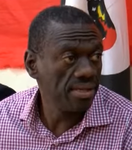2001 Ugandan presidential election
| ||||||||||||||||
| Registered | 10,775,836 | |||||||||||||||
|---|---|---|---|---|---|---|---|---|---|---|---|---|---|---|---|---|
| Turnout | 70.31% | |||||||||||||||
| ||||||||||||||||
 Results by district Museveni: 50–60% 60–70% 70–80% 80–90% >90% Besigye: 50–60% 70–80% 80–90% | ||||||||||||||||
| ||||||||||||||||
Presidential elections were held in Uganda on 12 March 2001. The incumbent Yoweri Museveni won 69% of the vote and was elected to a second term.[1] All candidates were independents, as political parties were banned at the time. Voter turnout was 70.3%.
Candidates[edit]
Yoweri Museveni was running for his second term in office in 2001. He took power in 1986 after winning a guerrilla war against President Tito Okello. Museveni's main rival was four-time rival Kizza Besigye, who was Museveni's personal physician and a military officer who broke ties with the NRM government in 2001.[2]
Results[edit]
| Candidate | Party | Votes | % | |
|---|---|---|---|---|
| Yoweri Museveni | Independent | 5,123,360 | 69.33 | |
| Kizza Besigye | Independent | 2,055,795 | 27.82 | |
| Aggrey Awori | Independent | 103,915 | 1.41 | |
| Kibirige Mayanja | Independent | 73,790 | 1.00 | |
| Francis Bwengye | Independent | 22,751 | 0.31 | |
| Karuhanga Chapaa | Independent | 10,080 | 0.14 | |
| Total | 7,389,691 | 100.00 | ||
| Valid votes | 7,389,691 | 97.54 | ||
| Invalid/blank votes | 186,453 | 2.46 | ||
| Total votes | 7,576,144 | 100.00 | ||
| Registered voters/turnout | 10,775,836 | 70.31 | ||
| Source: African Elections Database | ||||
Post-election events[edit]
Besigye did not concede the race but instead requested a formal vote recount on the basis of voter fraud. Museveni also claimed that there was a "rigging" of the vote, albeit in Besigye's favour; he also remarked that he should have won 75% of the vote instead. The independent election watchdog Election Monitoring Group found voter fraud to be minimal.[2][3] The same day after results were announced, a pipe bomb exploded in downtown Kampala, killing one woman; a similar explosion occurred on a minibus headed towards the capital, injuring three people. However, it was not immediately clear if the explosions were related to the presidential election.[2] In a majority decision, the Supreme Court of Uganda subsequently rejected Besigye's petition for a recount.[4][5] Shortly after being elected to a second term as president, Museveni pledged to step down before the next election but subsequently walked back on his promise.[6]
References[edit]
- ^ Elections in Uganda African Elections Database
- ^ a b c Fisher, Ian (15 March 2001). "Final Count Has Uganda President Winning 69% of Vote". The New York Times.
- ^ Borzello, Anna (14 March 2001). "Uganda's Museveni leads in 'rigged' elections". The Guardian.
- ^ Dagne, Ted. "Uganda: Recent Elections and Current Conditions" (PDF). CRS Report for Congress.
- ^ "2001 elections: Supreme Court Judges ruling". Daily Monitor. 16 December 2006. Archived from the original on 15 July 2017. Retrieved 6 May 2020.
- ^ "Yoweri Museveni - Uganda's president profiled". BBC. 17 February 2016.


